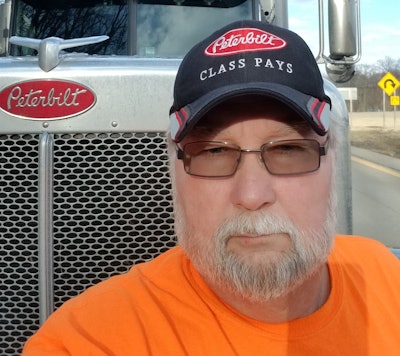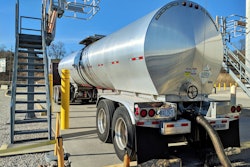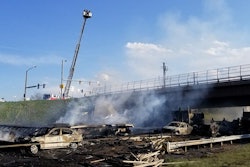Previously in this series: Think tank: A closer look at liquid bulk hauling
 Owner-operator Dennis Holliday
Owner-operator Dennis HollidayDennis Holliday started trucking in the early 1980s in a GMC Astro cabover, hauling for North American Van Lines. Like most household movers, he was involved in a lot of the loading and unloading. He says he didn’t get into liquid-bulk tank hauling until he “got smart.”
“There’s a lot less [physical] work in tank,” he says. “It was the money, primarily, that drew me into tanks.” He was off to the races with Quality Carriers as early as 1994. He’s since hauled compressed gas in addition to his current bread and butter: hazardous materials chemicals. He’s leased to Heniff Transportation, based outside Chicago.
“I make more money than I’ve ever made anywhere,” says Holliday, of Alexandria, Alabama. He hauls in a 2019 Peterbilt 389 with a 565-hp Cummins X15 and an air compressor for offloading product. Even with the fixed expenses of a truck note – Holliday’s on a 4.5-year trade cycle – he cleared more than the average for leased owner-operators in 2018.
Tank rates traditionally are quoted with roundtrip out-loaded-back-empty expectations. Holliday is paid 67 percent of every load pulling Heniff company trailers, and last year he had his highest revenue ever, topping $170,000, even with taking off July. He uses his own compressor, about $3,500 installed. He hasn’t seen the need for further investment in his own hydraulic pumping mechanism for offload, though that would merit an extra percentage of every load.
He’s made some recent hay of Heniff’s acquisition of chemical tank puller Miller Transporters, in effect more than doubling Heniff’s size. Holliday’s deadhead miles are down with new freight opportunities, thanks to Miller’s strong Southern regional coverage.
When he’s got good load choices, Holliday gravitates toward solvents and flammables that tend to fit his approach: Less work, more money. “We don’t have to hunt a load — wherever you go, they try to offer you two, three loads. First question out of our mouth is, ‘Well, what does it pay?’ ”
![In his chemical tank operation with this 2019 389, Holliday has to re-up his hazmat endorsement every four years when renewing his CDL, also a prerequisite in other hazmat niches. Heniff, the company he’s leased to, requires its own recertification class every three years, and monthly training. “When you first start,” he says, it’s learning “how to air-off and pump-off loads – and other basics of hauling a tanker.” The hazmat endorsement itself requires the periodic background check and fingerprints, likewise the state’s written test on hazmat regs and procedures. “As many years as I’ve been doing it, every four years I go get the [regs] book anyway just to read through it before I take the test. You’re allowed to fail it at least once. In his home state, you have to pay the $25 to take the test again, right then.”](https://img.overdriveonline.com/files/base/randallreilly/all/image/2019/05/ovd.Dennis-holliday-truck-and-trailer-2019-05-02-14-50.png?auto=format%2Ccompress&fit=max&q=70&w=400) In his chemical tank operation with this 2019 389, Holliday has to re-up his hazmat endorsement every four years when renewing his CDL, also a prerequisite in other hazmat niches. Heniff, the company he’s leased to, requires its own recertification class every three years, and monthly training. “When you first start,” he says, it’s learning “how to air-off and pump-off loads – and other basics of hauling a tanker.” The hazmat endorsement itself requires the periodic background check and fingerprints, likewise the state’s written test on hazmat regs and procedures. “As many years as I’ve been doing it, every four years I go get the [regs] book anyway just to read through it before I take the test. You’re allowed to fail it at least once. In his home state, you have to pay the $25 to take the test again, right then.”
In his chemical tank operation with this 2019 389, Holliday has to re-up his hazmat endorsement every four years when renewing his CDL, also a prerequisite in other hazmat niches. Heniff, the company he’s leased to, requires its own recertification class every three years, and monthly training. “When you first start,” he says, it’s learning “how to air-off and pump-off loads – and other basics of hauling a tanker.” The hazmat endorsement itself requires the periodic background check and fingerprints, likewise the state’s written test on hazmat regs and procedures. “As many years as I’ve been doing it, every four years I go get the [regs] book anyway just to read through it before I take the test. You’re allowed to fail it at least once. In his home state, you have to pay the $25 to take the test again, right then.”
“I’ve been here long enough to know what to pick and what to stay away from. On the flipside of that, everybody has their ‘turn in the barrel,’ as I call it — this week you may not get all the gravy runs and take the hard stuff. They do keep an eye on who’s having the tough week — to do better next week. We all try to keep a very good working relationship between dispatchers and drivers.”
Holliday gets home for time off every two weeks, and he often gets brief stops at home when he’s routed through his area.
Next in this series: J.D. Howard: Short hauls and frequent home time with Midwest asphalt










